
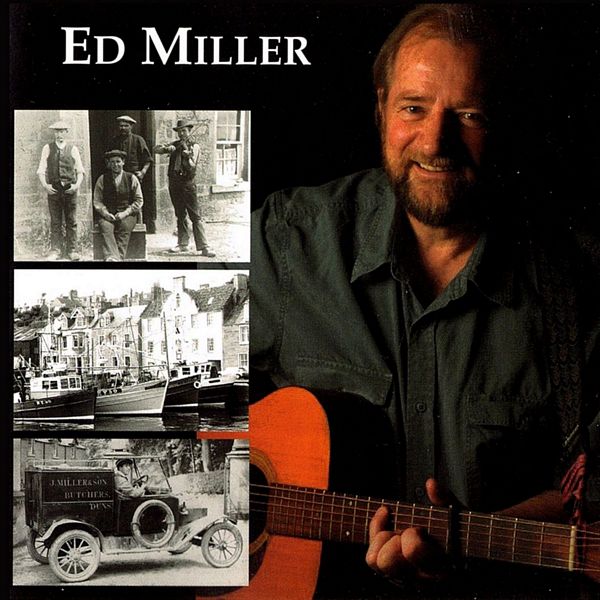 |
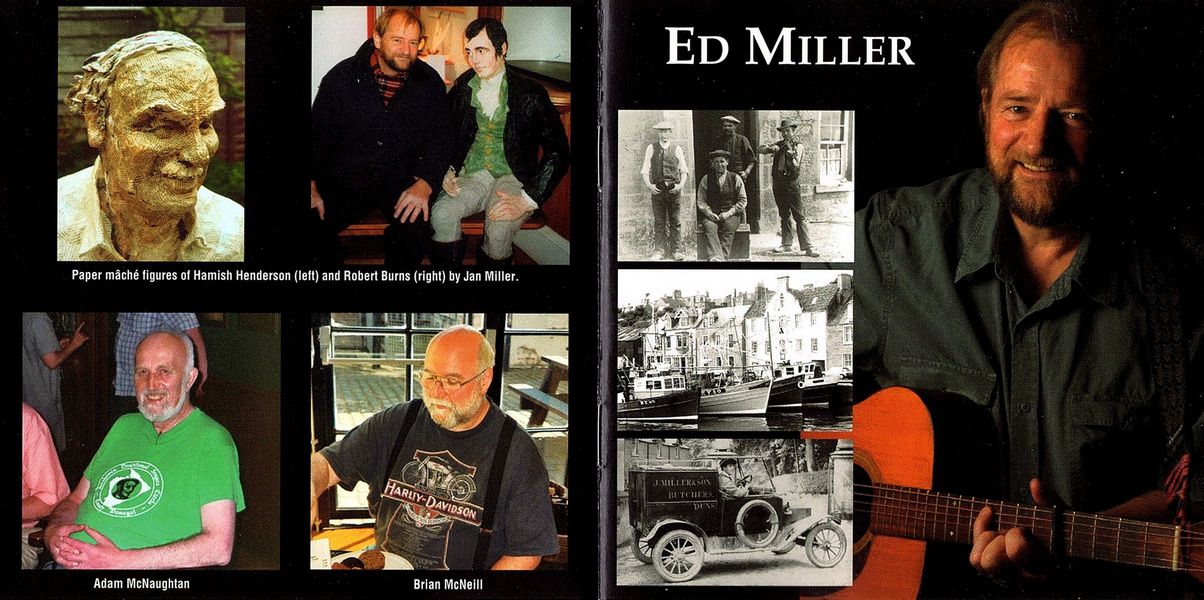
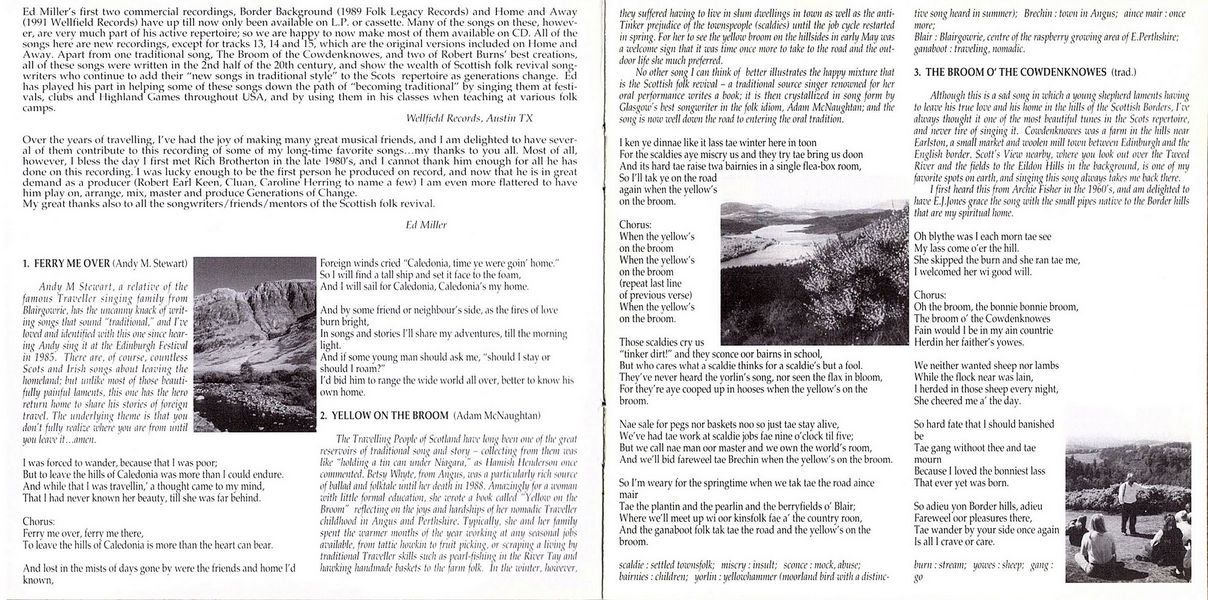
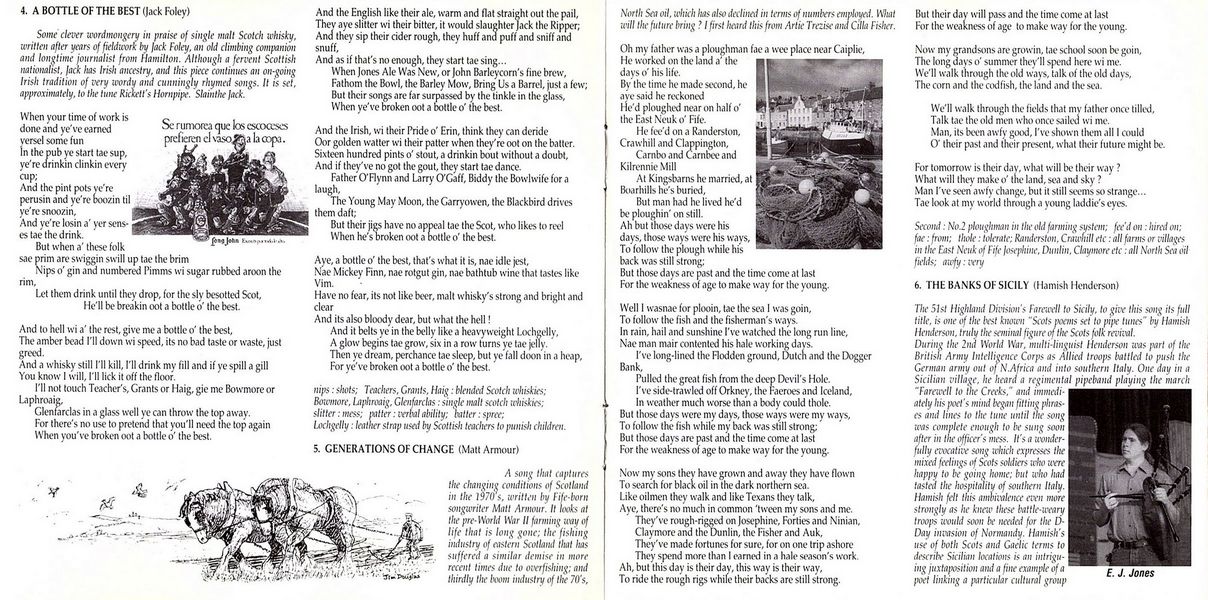 |
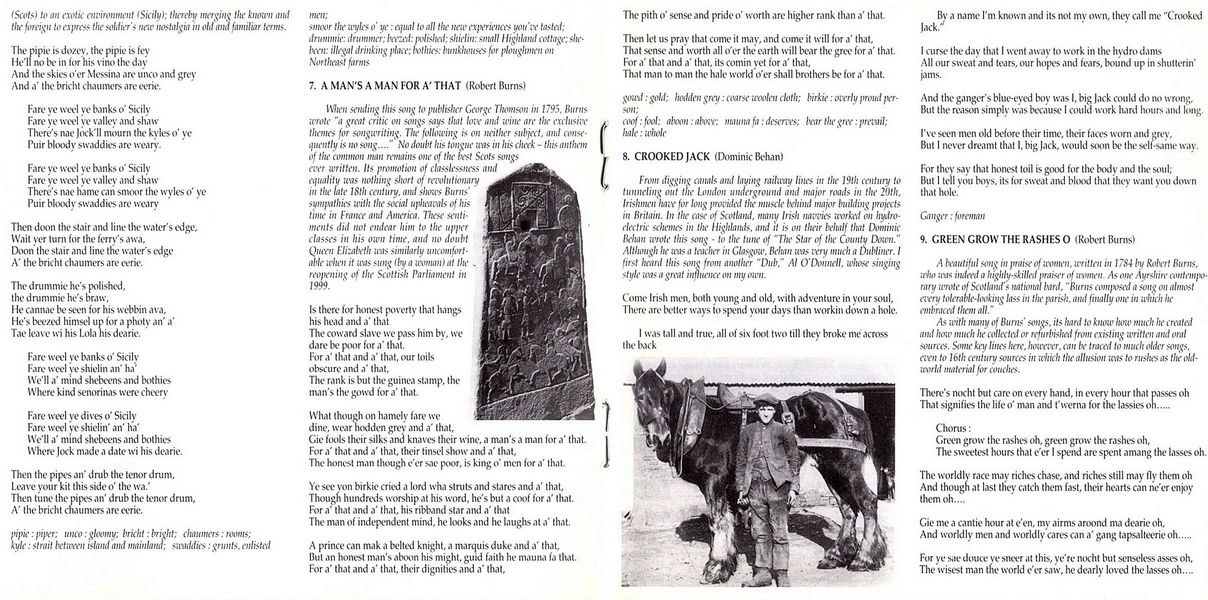
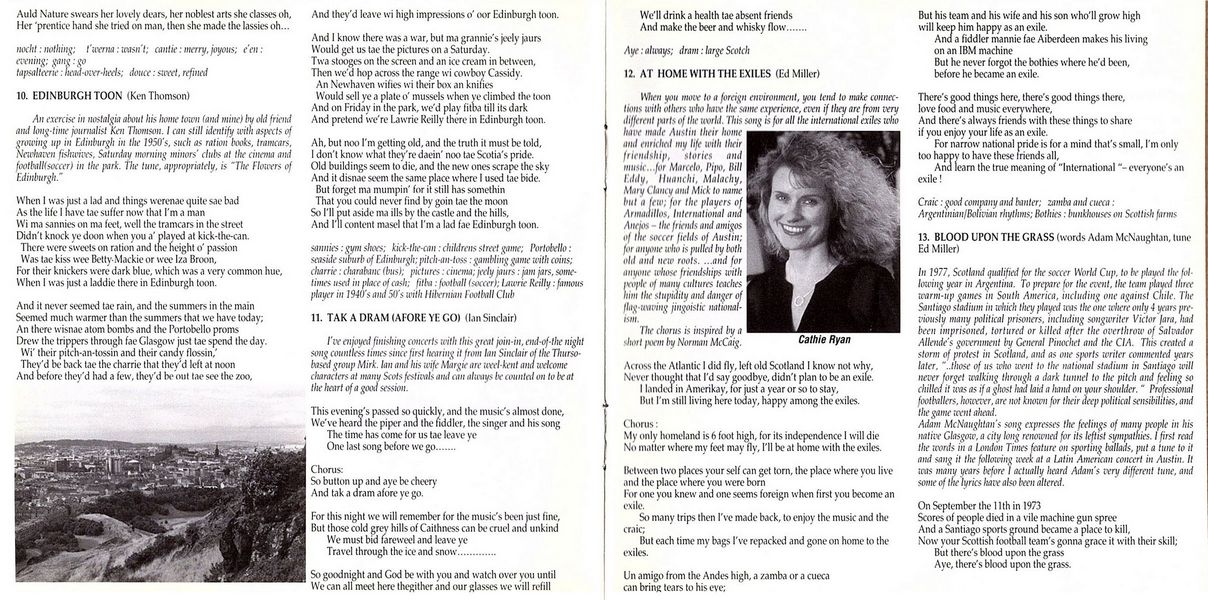
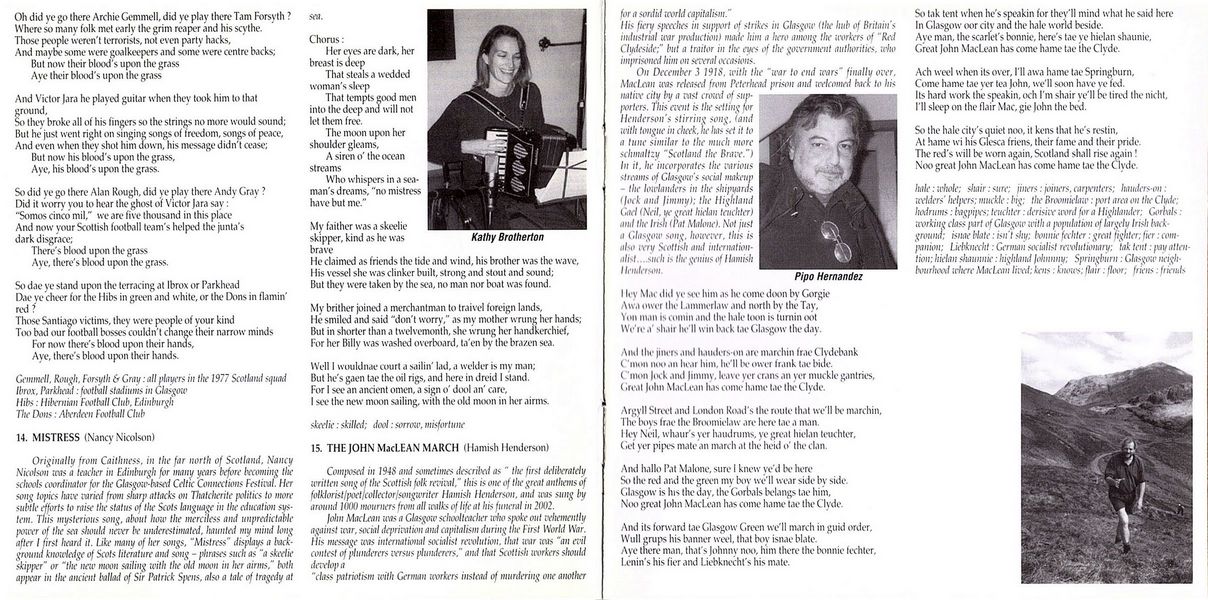 |
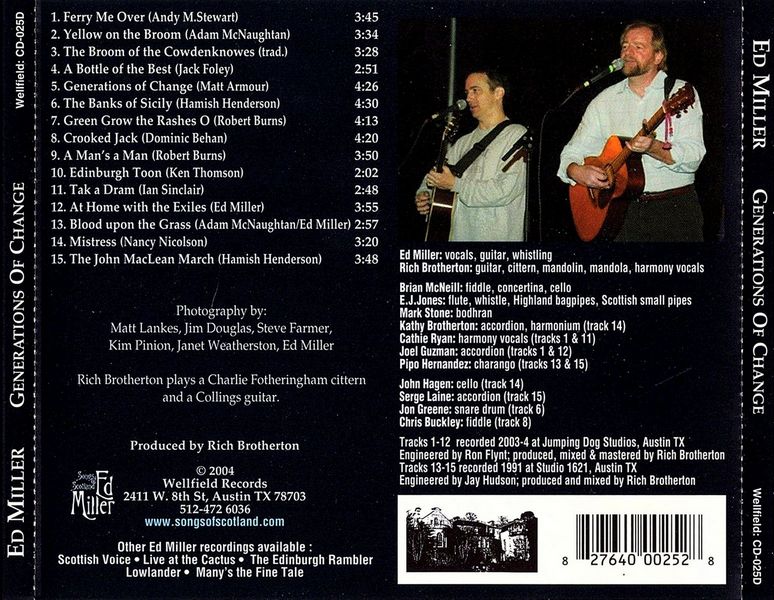
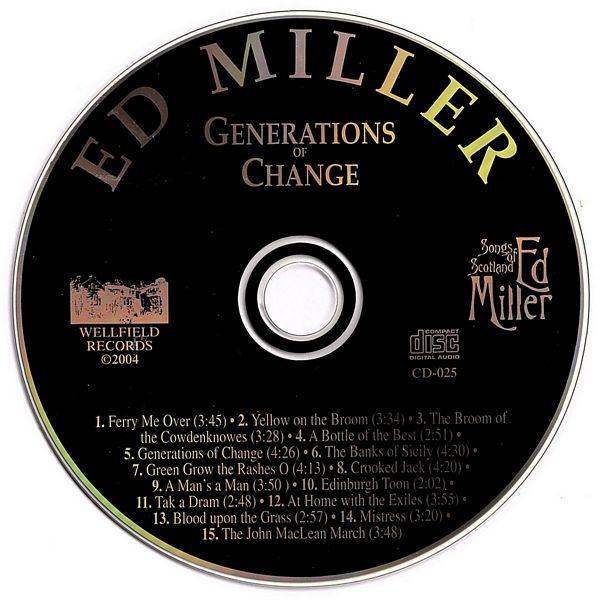 |
Sleeve Notes
Ed Miller's first two commercial recordings, Border Background (1989 Folk Legacy Records) and Home and Away (1991 Wellfield Records) have up till now only been available on L.P. or cassette. Many of the songs on these, however, are very much part of his active repertoire; so we are happy to now make most of them available on CD (USA). All of the songs here are new recordings, except for tracks 13, 14 and 15, which are the original versions included on Home and Away. Apart from one traditional song, The Broom of the Cowdenknowes, and two of Robert Burns' best creations, all of these songs were written in the 2nd half of the 20th century, and show the wealth of Scottish folk revival songwriters who continue to add their "new songs in traditional style" to the Scots repertoire as generations change. Ed has played his part in helping some of these songs down the path of "becoming traditional" by singing them at festivals, clubs and Highland Games throughout USA, and by using them in his classes when teaching at various folk camps.
Wellfield Records, Austin TX
Over the years of travelling, I've had the joy of making many great musical friends, and I am delighted to have several of them contribute to this recording of some of my long-time favorite songs … my thanks to you all. Most of all, however, I bless the day I first met Rich Brotherton in the late 1980's, and I cannot thank him enough for all he has done on this recording. I was lucky enough to be the first person he produced on record, and now that he is in great demand as a producer (Robert Earl Keen, Cluan, Caroline Herring to name a few) I am even more flattered to have him play on, arrange, mix, master and produce Generations of Change.
My great thanks also to all the songwriters/friends/mentors of the Scottish folk revival.
Ed Miller
FERRY ME OVER (Andy M. Stewart) — Andy M. Stewart, a relative of the famous Traveller singing family from Blairgowrie, has the uncanny knack of writing songs that sound "traditional," and I've loved and identified with this one since hearing Andy sing it at the Edinburgh Festival in 1985. There are, of course, countless Scots and Irish songs about leaving the homeland; but unlike most of those beautifully painful laments, this one has the hero return home to share his stories of foreign travel. The underlying theme is that you don't fully realize where you are from until yon leave it … amen.
YELLOW ON THE BROOM (Adam McNanghtan) — The Travelling People of Scotland have long been one of the great reservoirs of traditional song and story collecting from them was like "holding a tin can under Niagara," as Hamish Henderson once commented. Betsy Whyte, from Angus, was a particularly rich source of ballad and folktale until her death in 1988. Amazingly for a woman with little formal education, she wrote a book called "Yellow on the Broom" reflecting on the joys and hardships of her nomadic Traveller childhood in Angus and Perthshire. Typically, she and her family spent the warmer months of the year working al any seasonal jobs available, from tattie howkin to fruit picking, or scraping a living by traditional Traveller skills such as pearl-fishing in the River Tay and hawking handmade baskets to the farm folk. In the winter, however, they suffered having to live in slum dwellings in town as well as the anti-Tinker prejudice of the townspeople (scaldies) until the job cycle restarted in spring. For her to see the yellow broom on the hillsides in early May was a welcome sign that it was time once more to take to the road and the outdoor life she much preferred.
No other song I can think of belter illustrates the happy mixture that is the Scottish folk revival — a traditional source singer renowned for her oral performance writes a book; it is then crystallized in song form by Glasgow's best songwriter in the folk idiom, Adam McNanghtan; and the song is now well down the road to entering the oral tradition.
THE BROOM O' THE COWDENKNOWES (trad.) — Although this is a sad song in which a young shepherd laments having to leave his true love and his home in the hills of the Scottish Borders, I've always thought it one of the most beautiful tunes in the Scots repertoire, and never tire of singing it. Cowdenknowes was a farm in the hills near Earlston, a small market and woolen mill town between Edinburgh and the English border. Scott's View nearby, where you look out over the Tweed River and the fields to the Eildon Hills in the background, is one of my favorite spots on earth, and singing this song always takes me back there.
I first heard this from Archie Fisher in the 1960's, and am delighted to have E.J. Jones grace the song with the small pipes native to the Border hills that are my spiritual home.
A BOTTLE OF THE BEST (Jack Foley) — Some clever wordmongery in praise of single malt Scotch whisky, written after years of fieldwork by Jack Foley, an old climbing companion and longtime journalist from Hamilton. Although a fervent Scottish nationalist, Jack has Irish ancestry, and this piece continues an on-going Irish tradition of very wordy and cunningly rhymed songs. It is set, approximately, to the tune Rickett's Hornpipe. Slainthe jack.
GENERATIONS OF CHANGE (Matt Armour) — A song that captures the changing conditions of Scotland in the 1970s, written by Fife-born songwriter Matt Armour. It looks al the pre-World War II farming way of life that is long gone; the fishing industry of eastern Scotland that has suffered a similar demise in more recent times due to overfishing; and thirdly the boom industry of the 70's, North Sea oil, which has also declined in terms of numbers employed. What will the future bring ? I first heard this from Artie Treziseand Cilia Fisher.
THE BANKS OF SICILY (Hamish Henderson) — The 51st Highland Division's Farewell to Sicily, to give this song its full title, is one of the best known "Scots poems set to pipe tunes" by Hamish Henderson, truly the seminal figure of the Scots folk revival.
During the 2nd World War, multi-linguist Henderson was part of the British Army Intelligence Corps as Allied troops battled to push the German army out of N.Africa and into southern Italy. One day in a Sicilian village, he heard a regimental pipeband playing the march "Farewell to the Creeks," and immediately his poet's mind began fitting phrases and lines to the tune until the song was complete enough to be sung soon after in the officer's mess. It's a wonderfully evocative song which expresses the mixed feelings of Scots soldiers who were happy to be going home; but who had lasted the hospitality of southern Italy. Hamish felt this ambivalence even more strongly as he knew these battle-weary troops would soon be needed for the D-Day invasion of Normandy. Hamish's use of both Scots and Gaelic terms to describe Sicilian locations is an intriguing juxtaposition and a fine example of a pool linking a particular cultural group
(Scots) to an exotic environment (Sicily); thereby merging the known and the foreign to express the soldier's new nostalgia in old and familiar terms.
A MAN'S A MAN FOR A' THAT (Robert Burns) — When sending this song to publisher George Thomson in 1795, Burns wrote "a great critic on songs says that love and wine are the exclusive themes for songwriting. The following is on neither subject, and consequently is no song … " No doubt his tongue was in his cheek — this anthem of the common man remains one of the best Scots songs ever written. Its promotion of classlessness and equality was nothing short of revolutionary in the late 18th century, and shows Burns' sympathies with the social upheavals of his time in France and America. These sentiments did not endear him to the upper classes in his own time, and no doubt Queen Elizabeth was similarly uncomfortable when it was sung (by a woman) al the reopening of the Scottish Parliament in 1999.
CROOKED JACK (Dominic Behan) — From digging canals and laying railway lines in the 19th century to tunneling out the London underground and major roads in the 20th, Irishmen have for long provided the muscle behind major building projects in Britain. In the case of Scotland, many Irish navvies worked on hydroelectric schemes in the Highlands, and it is on their behalf that Dominic Behan wrote this song — to the tune of "The Star of the County Down." Although he was a teacher in Glasgow, Behan was very much a Dubliner. I first heard this song from another "Dub," Al O'Donnell, whose singing style was a great influence on my own.
GREEN GROW THE RASHES O (Robert Burns) — A beautiful song in praise of women, written in 1784 by Robert Burns, who was indeed a highly-skilled praiser of women. As one Ayrshire contemporary wrote of Scotland's national bard,"Burns composed a song on almost every tolerable-looking lass in the parish, and finally one in which he embraced them all."
As with many of Burns' songs, its hard to know how much he created and how much he collected or refurbished from existing written and oral sources. Some key lines here, however, can be traced to much older songs, even to 16th century sources in which the allusion was to rushes as the old-world material for couches.
EDINBURGH TOON (Ken Thomson) — An exercise in nostalgia about his home town (and mine) by old friend and long-time journalist Ken Thomson. I can still identify with aspects of growing up in Edinburgh in the 1950's, such as ration books, tramcars, Newhavcn fishwives, Saturday morning minors' clubs al the cinema and football(soccer) in the park. The tune, appropriately, is "The Flowers of Edinburgh."
TAK A DRAM (AFORE YE GO) (Ian Sinclair) — I've enjoyed finishing concerts with this great join-in, end-of-the night song countless times since first hearing it from Ian Sinclair of the Thurso-based group Mirk. Ian and his wife Margie are weel-kent and welcome characters at many Scots festivals and can always be counted on to be at the heart of a good session.
AT HOME WITH THE EXILES (Ed Miller) — When you move to a foreign environment, you tend to make connections with others who have the same experience, even if they are from very different parts of the world. This song is for all the international exiles who have made Austin their home and enriched my life with their friendship, stories and music … for Marcelo, Pipo, Bill Eddy, Huanchi, Malachy, Mary Clancy and Mick to name but a few; for the players of Armadillos, International and Anejos — the friends and amigos of the soccer fields of Austin; for anyone who is pulled by both old and new roots … and for anyone whose friendships with people of many cultures teaches him the stupidity and danger of flag-waving jingoistic nationalism.
The chorus is inspired by a short poem by Norman McCaig.
BLOOD UPON THE GRASS (words Adam McNaughtan, tune Ed Miller) — In 1977, Scotland qualified for the soccer World Cup, to be played the following year in Argentina. To prepare for the event, the team played three warm-up games in South America, including one against Chile. The Santiago stadium in which they played was the one where only 4 years previously many political prisoners, including songwriter Victor Jara, had been imprisoned, tortured or killed after the overthrow of Salvador Allende's government by General Pinochet and the CIA. This created a storm of protest in Scotland, and as one sports writer commented years later, "..those of us who went to the national stadium in Santiago will never forget walking through a dark tunnel to the pitch and feeling so chilled it was as if a ghost had laid a hand on your shoulder." Professional footballers, however, are not known for their deep political sensibilities, and the game went ahead.
Adam McNaughtan's song expresses the feelings of many people in his native Glasgow, a city long renowned for its leftist sympathies. I first read the words in a London Times feature on sporting ballads, put a tune to it and sang it the following week at a Latin American concert in Austin. It was many years before I actually heard Adam's very different tune, and some of the lyrics have also been altered.
MISTRESS (Nancy Nicolson) — Originally from Caithness, in the far north of Scotland, Nancy Nicolson was a teacher in Edinburgh for many years before becoming the schools coordinator for the Glasgow-based Celtic Connections Festival. Her song topics have varied from sharp attacks on Thatcherite politics to more subtle efforts to raise the status of the Scots language in the education system. This mysterious song, about how the merciless and unpredictable power of the sea should never be underestimated, haunted my mind long after I first heard it. Like many of her songs, "Mistress" displays a background knowledge of Scots literature and song — phrases such as "a skeelie skipper" or "the new moon sailing with the old moon in her aims," both appear in the ancient ballad of Sir Patrick Spens, also a tale of tragedy at sea.
THE JOHN MacLEAN MARCH (Hamish Henderson) — Composed in 1948 and sometimes described as" the first deliberately written song of the Scottish folk revival," this is one of the great anthems of folklorist/poet/collector/songwriter Hamish Henderson, and was sung by around 1000 mourners from all walks of life at his funeral in 2002.
John MacLean was a Glasgow schoolteacher who spoke out vehemently against war, social deprivation and capitalism during the First World War. His message was international socialist revolution, that war was "an evil contest of plunderers versus plunderers," and that Scottish workers should develop a "class patriotism with German workers instead of murdering one another for a sordid world capitalism."
His fiery speeches in support of strikes in Glasgow (the hub of Britain's industrial war production) made him a hero among the workers of "Red Clydeside;" but a traitor in the eyes of the government authorities, who imprisoned him on several occasions.
On December 3 1918, with the "war to end wars" finally over, MacLean was released from Peterhead prison and welcomed back to his native city by a vast crowd of supporters. This event is the setting for Henderson's stirring song, (and with tongue in cheek, he has set it to a tune similar to the much more schmaltzy "Scotland the Brave.") In it, he incorporates the various streams of Glasgow's social makeup — the lowlanders in the shipyards (Jock and Jimmy); the Highland Gael (Neil, ye great hielan teuchter) and the Irish (Pat Malone). Not just a Glasgow song, however, this is also very Scottish and internationalist … such is the genius of Hamish Henderson.